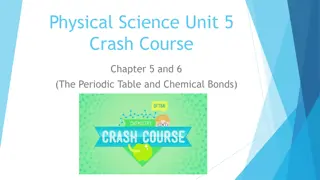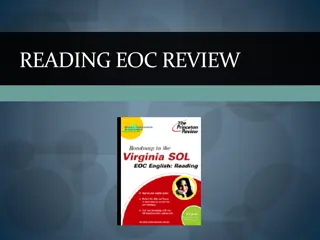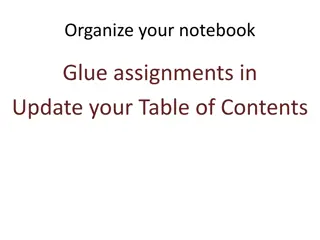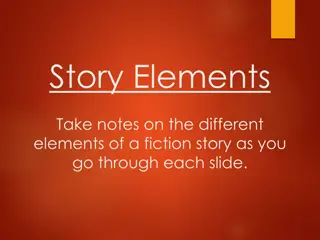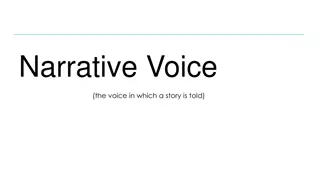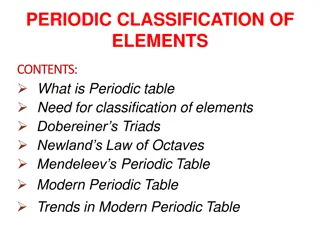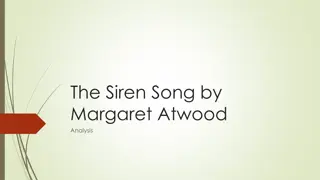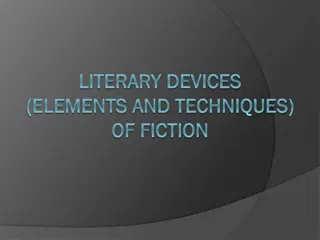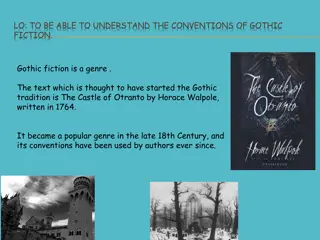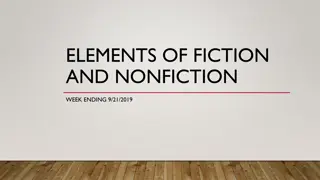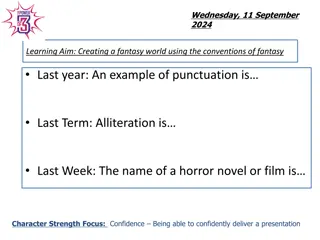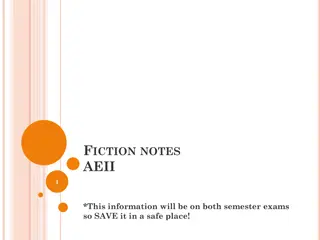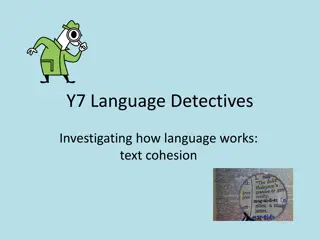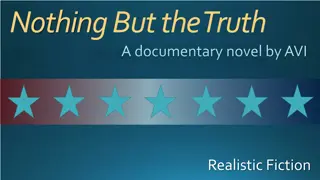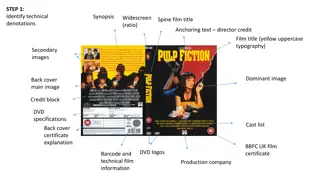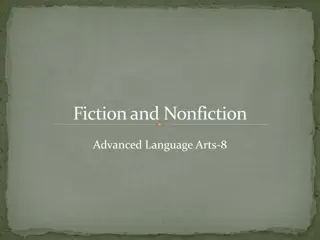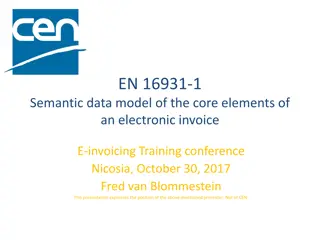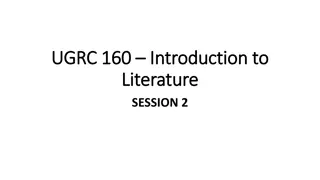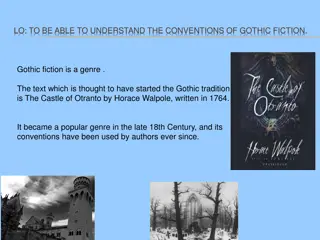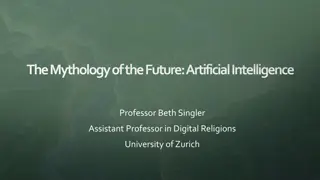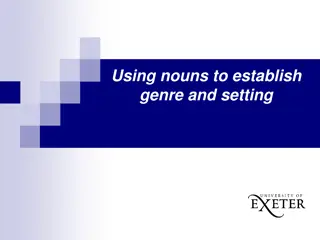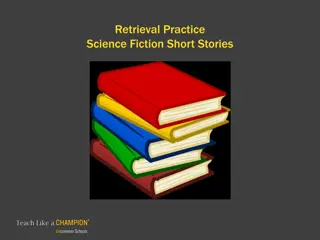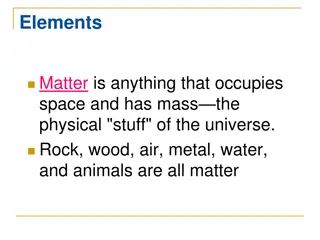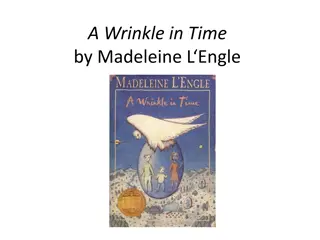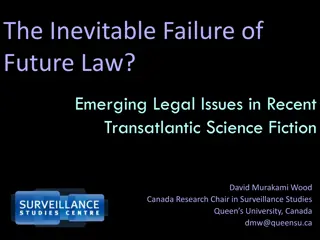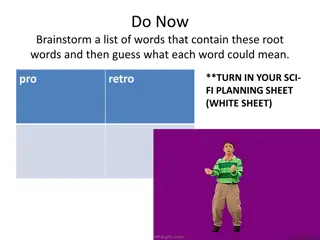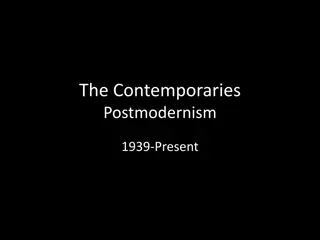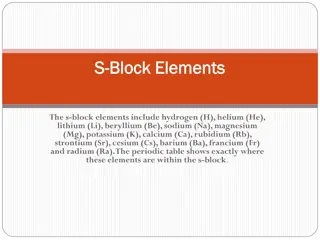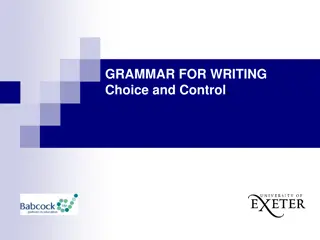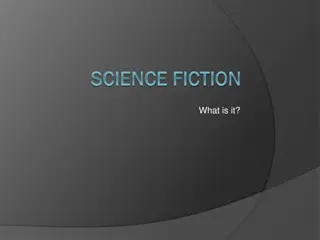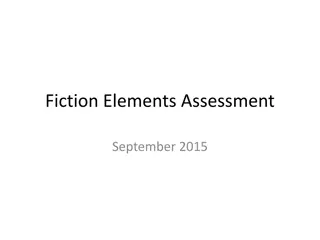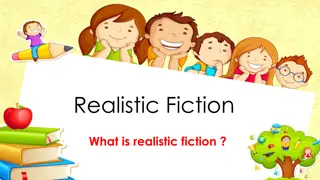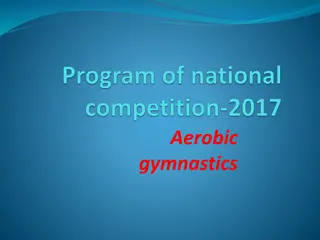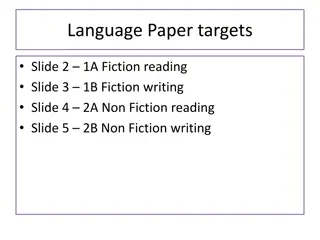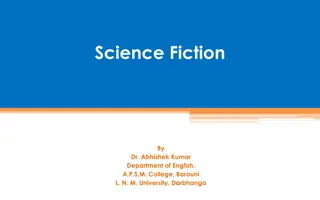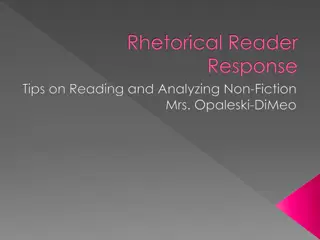Exploring Citizen Journalism and Non-Fiction Writing
Explore the world of citizen journalism and non-fiction writing, learning about text types, adapting writing to conventions, considering audience, purpose, and tone. Discover the significance and usefulness of non-fiction writing, and delve into creating various text types. Uncover the role of citiz
1 views • 11 slides
Understanding the Periodic Table and Chemical Bonds in Physical Science
The periodic table organizes elements based on their properties, with rows representing periods and columns representing groups. Mendeleev's early table laid the foundation for predicting undiscovered elements. Today's periodic table orders elements by atomic number, showcasing the periodic law and
3 views • 15 slides
Reading EOC Review: Test Structure, Types of Selections, and Breakdown
The Reading EOC Review covers the test makeup, types of reading selections, and breakdown of questions and content to help you prepare effectively. The test comprises sections with 55 scored questions to be answered, focusing on functional literacy and narrative/fiction elements, including poetry, p
8 views • 26 slides
Exploring Historical Fiction: Elements and Examples
Discover the essence of historical fiction, its key elements, and examples like "Forrest Gump." Learn how plausibility and interpretation play pivotal roles in creating captivating narratives that blend fiction with historical events.
0 views • 11 slides
Spring 2015 English 110 Final Exam Information
Spring 2015 English 110 Final Exam includes an Essay Final Exam to be completed by May 21st and an Objective Final Exam on May 27th or May 28th. The Essay Final consists of flash fiction tasks, literary criticisms, and analysis, while the Objective Final covers fiction elements identification and an
0 views • 7 slides
Essential Elements of Fiction Storytelling
Dive into the key components that make up a compelling fiction story, including plot development, setting, mood creation, character conflicts, and the use of imagery and dialogue to enhance the reader's experience. Explore these foundational elements to enhance your storytelling skills.
1 views • 36 slides
Understanding Narrative Voice in Fiction Writing
Explore the elements of narrative voice in fiction writing, including tense, perspective, and language choices. Learn how authors decide on the tense and perspective for their stories, and consider different language styles that suit various characters and perspectives. Discover the nuances of first
1 views • 7 slides
Evolution of Periodic Table and Classification of Elements
The Periodic Table is a systematic arrangement of elements based on atomic number and properties. Over time, chemists developed various classification methods such as Dobereiner's Triads, Newland's Law of Octaves, Mendeleev's Periodic Table, and the Modern Periodic Table to organize the increasing n
1 views • 26 slides
Margaret Atwood's Analysis of "The Siren Song
Margaret Atwood, a renowned Canadian author, delves into the plight of humans through speculative fiction with elements of dystopia and science-fiction. She is an environmentalist who addresses issues like global warming in her works. Atwood's writing style includes free verse poetry with enjambment
16 views • 18 slides
Explore Literary Devices and Elements of Fiction
Dive into the world of literary devices and elements of fiction, including setting, mood, plot, flashback, and foreshadowing. Understand how sensory details enhance writing and learn about techniques such as allusion, figurative language, and more. Discover the significance of these elements in shap
1 views • 28 slides
D-Block Elements: Properties and Classification in Chemistry
Welcome to the Department of Chemistry at Kisan Veer Mahavidyalaya, Wai. Explore the Chemistry of Elements of the 3d series, focusing on d-Block Elements and Transition Elements. Learn about their electronic structure, colored ions, magnetic properties, oxidation states, and complex formation. Under
0 views • 34 slides
Understanding Gothic Fiction Conventions
Explore the origins and key features of Gothic fiction, including dark settings, supernatural elements, and eerie atmospheres. Analyze gothic story openings and extract examples from works like Frankenstein to understand gothic features and emotional impact.
0 views • 25 slides
Exploring Elements of Fiction and Nonfiction in Classroom Activities
Engage students in a week-long journey to explore elements of fiction and nonfiction through class activities centered around reading, discussion, vocabulary building, and comprehension quizzes. From learning terms and definitions to analyzing stories, students will enhance their understanding of di
0 views • 6 slides
Exploring Fantasy Worlds: Conventions, Types, and Challenges
Dive into the realm of fantasy literature and learn about the conventions, types, and differences between fantasy and sci-fi. Uncover the definition of fantasy, explore popular genres, and discover sub-genres like fiction, science fiction, and historical fiction. Engage in thought-provoking challeng
0 views • 17 slides
Understanding Fiction: Essential Plot and Character Elements
Dive into the world of fiction with this comprehensive guide that covers essential elements such as plot structure, character development, conflict types, setting descriptions, and narrative perspectives. Learn about the key components of storytelling and how they shape engaging narratives. Save thi
0 views • 16 slides
Washington Irving: Father of American Fiction and Pioneer of American Romanticism
Washington Irving, an influential American author of the early 19th century, is revered as the Father of American fiction. Known for iconic works like "The Legend of Sleepy Hollow" and "Rip Van Winkle," Irving played a crucial role in establishing American literature as an independent art form. His
1 views • 14 slides
Understanding Text Cohesion in Non-Fiction Writing
Exploring text cohesion in non-fiction writing by analyzing how ideas are linked and sequenced clearly using key linguistic elements like nouns, pronouns, determiners, and verbs. The importance of maintaining coherence for readers to easily follow the text is highlighted through examples and explana
0 views • 8 slides
Nothing But the Truth: A Documentary Novel by AVI
A realistic fiction novel, "Nothing But the Truth" by AVI, delves into the themes of responsibility, rumors, media influence, and the elements of fiction. Through a documentary-style approach, it explores the dynamics among students, teachers, schools, and the complexity of truth in society, sheddin
0 views • 21 slides
Analyzing DVD Cover Design Elements for Pulp Fiction
Identifying technical denotations and developing connotations from the DVD cover of Pulp Fiction, focusing on elements like the spine details, synopsis, anchoring text, dominant images, and cast list to understand the design choices and intended messages.
0 views • 6 slides
Understanding Fiction and Nonfiction in Language Arts
Fiction and nonfiction are two key genres in literature. Fiction involves imaginative storytelling with elements like plot, characters, setting, point of view, and theme. Nonfiction, on the other hand, deals with real people, events, and ideas, aiming to inform, persuade, or entertain readers. Explo
0 views • 14 slides
Semantic Data Model of Electronic Invoicing Core Elements
Presentation by Fred van Blommestein on the EN16931-1 semantic data model of core elements in electronic invoicing, covering invoice processes, core invoice design, semantic model details, business rules, and invoicing principles. The model includes 160 elements in 33 groups, with mandatory elements
0 views • 13 slides
Understanding Elements of Fiction in Prose Writing
This session delves into the essential elements of fiction in prose writing, covering plot development, characterization, setting, and more. Students will learn to analyze and interpret these elements in stories, with a focus on applying their understanding to a specific short story. Through detaile
0 views • 15 slides
Understanding Gothic Fiction Conventions in Literature
Gothic fiction is a captivating genre rooted in dark, mysterious settings, supernatural elements, and eerie atmospheres. Originating with "The Castle of Otranto" by Horace Walpole, this genre has evolved to encompass elements like family curses, isolated castles, and sinister creatures. Dive into th
0 views • 25 slides
Exploring Modern AI Mythology and Science Fiction Interplay
The relationship between modern AI mythology and science fiction is examined through examples like Roko's Basilisk and "I Have No Mouth And I Must Scream." These narratives delve into the fears and possibilities surrounding artificial intelligence, blending speculative elements with ethical consider
0 views • 14 slides
Creative Noun Usage in Science Fiction Writing
Explore the art of using nouns to establish genre, setting, and character names in science fiction writing. Learn how authors like Philip Reeve utilize proper nouns to create immersive worlds and unique characters. Delve into the significance of authentic text, discussion, and purposeful learning pr
0 views • 10 slides
Science Fiction Retrieval Practice: Short Stories Insights
Explore futuristic technologies, incongruity, and speculative fiction elements in science fiction short stories like "Robbie" and "There Will Come Soft Rains." Uncover the connections to historical events, like the Cold War, through literary analysis of these captivating narratives.
0 views • 16 slides
Exploring the World of Matter and Elements
Matter is the physical "stuff" of the universe, encompassing elements that make up rocks, wood, air, metals, water, and living organisms. Chemical elements are the building blocks of matter, with essential elements like oxygen, carbon, hydrogen, and nitrogen constituting a significant part of living
0 views • 24 slides
Exploring 'A Wrinkle in Time' by Madeleine L'Engle: Author, Themes, and Genre
Delve into the world of "A Wrinkle in Time" by Madeleine L'Engle, a timeless classic that combines elements of science fiction and fantasy. Discover the life of the author, Madeleine L'Engle, her inspirations, and the essential questions raised in the novel. Explore themes of love, fear, empowerment
0 views • 24 slides
Exploring Legal Themes in Science Fiction: The Inevitable Failure of Future Law
This study delves into emerging legal issues in recent transatlantic science fiction works by authors like Charles Stross, Ken McLeod, and Paolo Bacigalupi. It examines the portrayal of law in SF and what insights it offers about our legal systems. Through a systematic survey of over 300 novels and
0 views • 12 slides
Sci-Fi Word Exploration: Unraveling the Roots
Dive into the futuristic world of science fiction as we uncover the meanings behind words containing the root elements "pro" and "retro." Join us on a linguistic journey exploring terms like proclivity, profane, proficient, profound, profuse, and retroflection. Enhance your vocabulary and imaginatio
0 views • 15 slides
Exploring Postmodernism: Literature, Poetry, and Nonfiction in the Contemporary Era
Delve into the Postmodern era from 1939 to the present, characterized by a blend of fiction and non-fiction, diverse narratives, and challenging traditional literary structures. Postmodern literature allows for multiple interpretations, blending different worlds and forms. Postmodern poetry, exempli
0 views • 9 slides
Understanding S-Block Elements in the Periodic Table
The s-block elements in the Periodic Table consist of 14 elements with unique properties and characteristics. Lithium, sodium, and potassium are notable members of Group 1, characterized by their reactivity and ability to form alkaline solutions when in contact with water. These soft metals exhibit
0 views • 23 slides
Teaching Writing Creatively for Narrative Fiction
Explore the principles of teaching writing creatively for narrative fiction, emphasizing the importance of engaging young writers' imaginations, emotions, and beliefs. Learn how to create an enriching environment that encourages exploration and experimentation in the writing process. Discover how ev
0 views • 71 slides
Exploring the World of Science Fiction
Science fiction is a genre that delves into imagined future scientific and technological advances, exploring major societal and environmental changes, space travel, time travel, and life on other planets. It combines elements of science and fiction to create believable yet captivating narratives tha
0 views • 14 slides
Annotating Fiction Elements: How To Effectively Mark Text and Add Comments
Learn how to annotate fiction elements with this step-by-step guide. Discover how to highlight text, change text colors, add comments, and insert text boxes for notes. Enhance your reading comprehension and analysis skills by mastering the art of annotating literary works.
0 views • 18 slides
Understanding Realistic Fiction: Features and Examples
Realistic fiction is a genre of writing that portrays characters, settings, and events that could exist in real life, even though the story itself may be fictional. The key features include believable characters, realistic settings, everyday problems, and plausible solutions. By sorting book covers
0 views • 9 slides
Aerobic Gymnastics Competition Guidelines and Rules
The guidelines for aerobic gymnastics competitions include compulsory elements, categories, competition spaces, deductions, and specific rules for different age groups. The competitions have specific parameters for elements allowed, lifting, floor elements, music length, maximum difficulty elements,
0 views • 17 slides
Language Paper Targets for Fiction and Non-Fiction Reading and Writing
This content provides detailed targets for Language Papers, focusing on Fiction and Non-Fiction reading and writing skills. It covers strategies such as being specific in analysis, using evidence from texts, improving sentence structures, enhancing vocabulary usage, and applying language techniques
0 views • 14 slides
Evolution of Science Fiction Literature
Science fiction genre, blending imaginative fantasy with scientific principles, has evolved significantly over time. Initially emerging in the late 1800s, it gained popularity alongside technological advancements. Theodore Sturgeon highlighted the essence of human stories within the genre. Iconic wo
0 views • 8 slides
Effective College Reading and Analysis Strategies for Non-Fiction Texts
Enhance your non-fiction reading and analysis skills with these practical tips: prepare yourself mentally before reading, preview the article, highlight key points while reading, monitor comprehension, and summarize the article afterward. Additionally, learn how to create a rhetorical précis to eff
0 views • 19 slides

